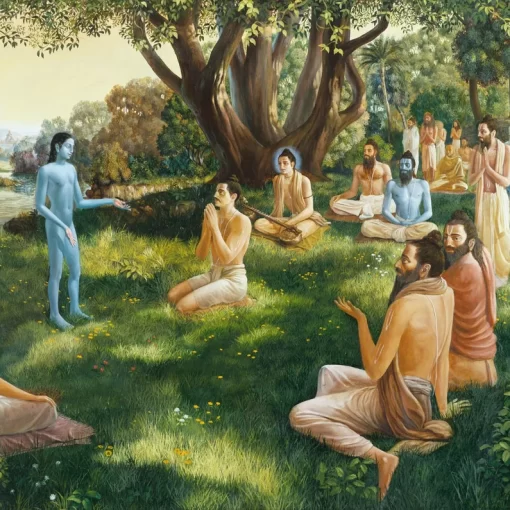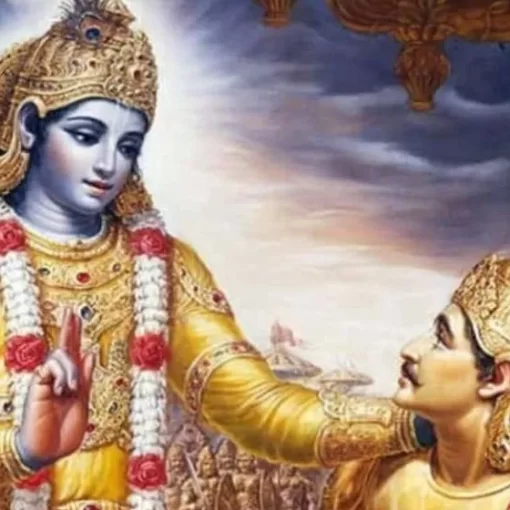The Universal Law of Action and Reaction
Every day, we make countless decisions—some small, others life-changing. These decisions, coupled with the actions we take, weave the intricate tapestry of our lives. Yet, how often do we pause to consider the deeper implications of our choices? The concept of karma, or the law of action and reaction, offers profound insights into how our actions shape not only our present but also our future.
The Bhagavad-gita and the teachings of Krishna consciousness explain karma as an eternal principle governing the material world. It serves as both a guide and a reminder of our responsibilities as spiritual beings navigating a temporary, material existence.
What is Karma?
The word karma originates from the Sanskrit root “kr,” meaning “to act.” In its simplest form, karma refers to action. However, in a broader sense, it encompasses the reactions or consequences that arise from our actions.
Krishna explains in the Bhagavad-gita:
“For every action, there is a corresponding reaction. Whether good or bad, one must bear the fruit of their actions.” (Bhagavad-gita 3.9)
This law is impartial and universal. Just as gravity affects everyone regardless of belief, karma operates independently of our awareness or acceptance of it.
Types of Karma
In Krishna consciousness, karma is categorized into three main types:
- Sanchita Karma: The accumulated karma from past lifetimes, which is stored and influences our present circumstances.
- Prarabdha Karma: The portion of sanchita karma that has ripened and manifests in our current life as experiences and challenges.
- Kriyamana Karma: The karma we are creating now through our actions, which will shape our future.
Understanding these types helps us recognize the interconnectedness of our actions across lifetimes and underscores the importance of conscious living.
How Karma Works
Karma operates on a simple principle: every action has a consequence. Positive actions yield favorable results, while negative actions result in challenges or suffering. However, it’s not as simplistic as “good equals good” or “bad equals bad.”
The underlying factor is intention. Krishna emphasizes that selfless actions performed in alignment with His will free us from karma, while selfish or harmful actions entangle us further in the cycle of birth and death.
Krishna advises Arjuna:
“Work done as a sacrifice for Vishnu has to be performed; otherwise, work binds one to this material world. Therefore, O son of Kunti, perform your prescribed duties for His satisfaction.” (Bhagavad-gita 3.9)
This verse highlights the transformative power of acting in devotion, which transcends the binding effects of karma.
Karma and Reincarnation
Karma is intricately tied to the concept of reincarnation. Each soul carries the impressions of past actions, which determine its current body, circumstances, and tendencies. This cycle, known as samsara, continues until the soul attains liberation (moksha).
The Śrīmad-Bhāgavatam explains:
“As the embodied soul takes on childhood, youth, and old age, it similarly takes on another body at death. The wise are not bewildered by this change.” (Bhagavad-gita 2.13)
This understanding shifts our perspective from temporary gains and losses to the eternal journey of the soul.
Escaping the Cycle of Karma
While karma governs material existence, Krishna consciousness offers a way to transcend it. By dedicating our actions to Krishna and cultivating devotion, we can break free from the cycle of karma and attain eternal freedom.
- Bhakti-Yoga: The path of devotion transforms all actions into offerings to Krishna. When we act with love and surrender, our karma dissolves.
- Chanting the Holy Names: The Hare Krishna mantra purifies the heart and neutralizes the effects of past karma.
- Studying the Scriptures: The Bhagavad-gita and Śrīmad-Bhāgavatam provide guidance on how to align our actions with Krishna’s will.
- Association with Devotees: Surrounding ourselves with spiritually inclined individuals inspires us to act selflessly and stay focused on Krishna.
Krishna assures us:
“One who surrenders unto Me is freed from all sinful reactions. Do not fear.” (Bhagavad-gita 18.66)
Stories of Karma and Liberation
The scriptures are rich with examples of how karma shapes lives and how devotion can transcend it.
- Ajāmila’s Redemption: Ajāmila, a sinful man, called out “Narayana” (a name of Krishna) at the time of death, inadvertently calling his son. Due to the power of Krishna’s name, he was liberated from his karmic debts and given a chance to attain spiritual perfection.
- Dhruva Mahārāja: Initially motivated by material desires, Dhruva’s devotion transformed his karma, and he achieved eternal service to Krishna.
- King Parikṣit: Cursed to die in seven days, Parikṣit used his remaining time to hear the Śrīmad-Bhāgavatam, transcending karma and preparing for liberation.
These stories demonstrate that while karma governs material life, devotion to Krishna can elevate us beyond its reach.
Practical Steps for Managing Karma
- Practice Mindful Living: Be aware of your intentions and ensure that your actions are aligned with compassion and service.
- Perform Your Duties: Act according to your prescribed duties (dharma) without attachment to results.
- Chant Krishna’s Names: Regular chanting purifies the mind and neutralizes past karmic reactions.
- Surrender to Krishna: Offer all actions, thoughts, and words to Krishna as an act of devotion.
Closing Thoughts
Karma is not a punishment but a universal law meant to guide us toward self-awareness and spiritual growth. Understanding karma helps us navigate life with greater responsibility and grace, recognizing that every action has consequences and that our destiny lies in our hands.
Yet, beyond the complexities of karma lies a simple truth: surrender to Krishna frees us from all bondage. By dedicating our lives to His service, we can transcend the cycle of action and reaction and return to our eternal home in the spiritual world.
Take a moment today to reflect on your actions. Are they binding you to the material world, or are they leading you closer to Krishna? The choice is yours, and Krishna is always ready to guide you.




